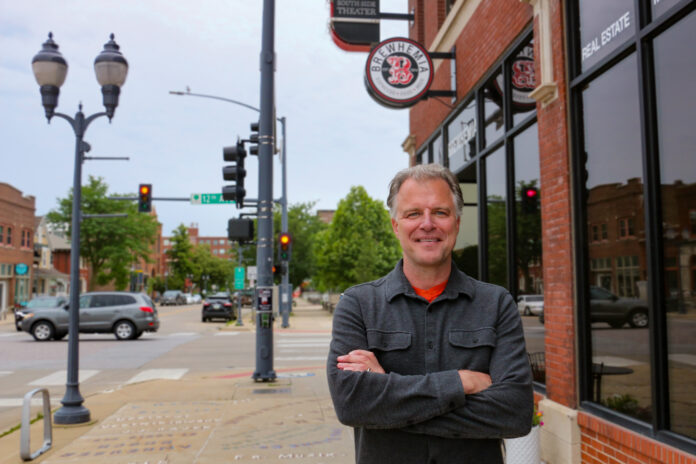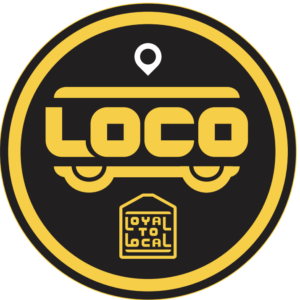
Steve Shriver admits the idea for LocoCR, a new local food delivery service set to debut later this year, might be a little bit wacky. “It doesn’t actually mean crazy,” Mr. Shriver said with a chuckle. “But it might.” The new service – named as a contraction between “loyal” and “local” – is set to […]
Want to Read More?
Get immediate, unlimited access to all subscriber content and much more.
Learn more in our subscriber FAQ.
- Unparalleled business coverage of the Iowa City / Cedar Rapids corridor.
- Immediate access to subscriber-only content on our website.
- 26 issues per year delivered digitally, in print or both.
- Support locally owned and operated journalism.
Do you want to read and share this article without a paywall?
Click here to purchase a paywall bypass linkSteve Shriver admits the idea for LocoCR, a new local food delivery service set to debut later this year, might be a little bit wacky.
“It doesn’t actually mean crazy,” Mr. Shriver said with a chuckle. “But it might.”
The new service – named as a contraction between "loyal" and "local" – is set to launch sometime this fall as a local alternative to national delivery services like DoorDash, Uber Eats and Grubhub.
 Mr. Shriver, who co-chairs the LocoCR development group with Todd Satterly, said the idea for LocoCR started with a group of restaurant owners “talking about the struggles that we're having” with national food delivery services, including high commissions that have squeezed profits for restaurant proprietors.
Mr. Shriver, who co-chairs the LocoCR development group with Todd Satterly, said the idea for LocoCR started with a group of restaurant owners “talking about the struggles that we're having” with national food delivery services, including high commissions that have squeezed profits for restaurant proprietors.
“It’s getting harder and harder to make money in retail and restaurants,” said Mr. Shriver, whose local business endeavors include Brewhemia, Soko Outfitters, Eco Lips and Bug Soother. “(Commodity) costs are up, labor is up, and people don't have as much disposable income to spend.”
When restaurants accept orders from national delivery apps, they typically pay a substantial commission to the app owners – as much as 30% to 40% in some cases, Mr. Shriver said. The customer also pays a delivery fee and may provide tips to drivers.
As a result of the added costs, many local establishments charge more for orders from delivery services than for in-house orders to make up the difference.
One of the features of LocoCR will be a lower commission charge – 15% to 20%, in most cases.
In addition, LocoCR drivers will be promised a minimum hourly wage of $15, substantially higher than national delivery app drivers earn, Mr. Shriver said.
“Ultimately, that should result in a better price for the end customer, better service and better pay for the drivers, and keeping it 100% local,” Mr. Shriver said. “It just makes so much sense.”
Delivery fees will start at $1.99 per mile, with an extra $1 for each additional mile, also lower than the fees charged by national delivery companies.
Mr. Shriver said most consumers are unaware of the costs paid by local restaurants on delivery app orders, as well as the lower wages for drivers.
“People might think that they’re supporting local by using these apps,” Mr. Shriver said. “But in reality, we're making less money on those orders than if you just ordered directly from us."
More on the economics of app deliveries
For a period of time, Mr. Shriver said, Brewhemia was just breaking even on app deliveries, “and we didn't even realize it because of all the fees and deductions.”
The potential solution, he said, would be for restaurant owners to increase food prices on those platforms to make up for the higher costs.
The downside of that strategy, Mr. Shriver said, is app owners attempt to require restaurants to offer the same prices on their platform as are offered to in-house customers.
“And if we don't comply with that, we get penalized by showing up lower in their search rankings,” he said. “There's no restaurant that's just getting rich (on app orders). We're talking about a real thin margin situation. Every penny counts.”
The delivery app operators also negotiate larger, more favorable contracts with larger restaurant chains, which could lead to free or subsidized delivery from those restaurants.
“We're having to pay higher marketing costs within the platform if we want to be noticed,” Mr. Shriver said. “And the worst part about it, from the local economy standpoint, is that this is tens of millions of dollars that's just getting vaporized into Silicon Valley. These are tech companies that are basically taking a stranglehold on local restaurants. They've convinced everybody that they should be using DoorDash, and people are doing it, so we feel like we have to participate. But participating is costing restaurants a lot of money.”
Service modeled on several predecessors
LocoCR is being modeled after CHOMP, a delivery service in Iowa City launched in 2017 by Jon Sewell, founder of LoCo Co-Op LLC. In addition to CHOMP, Mr. Sewell has also launched Nosh, a food delivery network in the Fort Collins, Colorado area.
LocoCR has no affiliation with LoCo Co-Op or with delivery services CHOMP and Nosh, but as of 2023, those two companies were delivering more than 300,000 orders per year. And Mr. Shriver said LocoCR is working with Mr. Sewell as a consultant to guide the development and roll-out of the LocoCR project.
LocoCR will also utilize CHOMP’s infrastructure to manage technology, logistics, drivers and other business functions.
Mr. Shriver noted that CHOMP has established a “very successful delivery model” that can be emulated.
“It’s been done in different areas across the country, and it's being done in Iowa City,” he said. “Why can't we do it here in Cedar Rapids?”
CHOMP also operated in Cedar Rapids, but the service was discontinued in August 2022, as leaders said they had not seen the same success in Cedar Rapids as in Iowa City.
The difference, Mr. Shriver said, was that the CHOMP restaurant group was owned by Iowa City restaurant shareholders and launched from there into the Cedar Rapids market.
“There wasn’t as much of a benefit (for local restaurants),” Mr. Shriver said. “As local as Iowa City, it’s still not local to Cedar Rapids, so there wasn’t as much adoption of the platform. When we launch LocoCR, it will be 100% owned by local restaurants.”
A local investor group has been formed, all affiliated with locally-owned restaurants, and 44 restaurants have signed up to participate with LocoCR so far.
Those restaurants include Kory Nanke’s Epic Catering restaurant group (including establishments such as Crosby’s, Czech Town Station, Home Port, Kickstand, Midtown Station, Midtown Reserve, North Point, Siena Italiana, Sko, Tic Toc and Tipsy Tomato), the Fun Not Fancy restaurant group (including The Hip-Stir, LP Street Food, Taco Gato, Cliff’s Dive Bar and Grill, Bricks Bar and Grill, Sacred Cow Tavern and the MoCo Game Room and Hot Dog Bar), Mr. B's, Sam's Pizza, the Map Room, Brewhemia, Ting’s Red Lantern, La Cantina, Quinton’s, Short’s Burger and Shine, the Blind Pig, La Cantina, Cedar River Landing and Pedaler’s Fork.
Another 50 restaurants have committed to participating in the platform, though not necessarily as investors.
The goal is to have 100 restaurants signed up prior to launch, Mr. Shriver said, “to be user-friendly to the consumer.”
“For this to serve me (as a customer) as well as DoorDash serves me, I need to have a good range of restaurants to order from,” Mr. Shriver said.
Other benefits for customers, restaurants and drivers
The LocoCR platform will offer several benefits for restaurateurs, customers and delivery drivers, Mr. Shriver said.
While DoorDash offers a “guaranteed active hourly rate” to its drivers, that rate can vary widely – on a slow day, it can be below minimum wage, Mr. Shriver said.
Conversely, LocoCR will guarantee its drivers a minimum hourly wage of $15.
“This will create a higher-quality driver, a higher-quality service and higher-quality expectations,” Mr. Shriver said, such as shorter delivery times and improved driver professionalism.
“One of the biggest complaints of our customers is that the (app) drivers sometimes don't care as much about the food as you would wish they did,” Mr. Shriver said.
Local restaurants are being offered the opportunity to invest in the LocoCR platform, at $500 per share.
“We made it very low, because this is a community project,” he said. “The more people on this, the better. The maximum investment is $10,000, so we're not letting anybody just own it outright.”
Chain restaurants won’t be allowed to participate in the LocoCR platform, with the exception of locally-owned franchises of national chains. Mr. Shriver said he hopes to raise $100,000 to $300,000 in pre-launch capital from the campaign.
Participating restaurants will earn a portion of the profits from app orders, whether they’re a shareholder or not, but shareholders will receive a higher return, Mr. Shriver said. Higher share levels will mean a larger distribution of profits – 80% of the profits will go towards the investor restaurants and 20% will go into the non-investor pool, with profits being distributed quarterly.
“It's basically a co-op model,” Mr. Shriver said. “We’re not officially a co-op, but we're an LLC acting like a co-op.”
Another primary benefit for participating restaurants will be local ownership of customer data. When a restaurant accepts an order from a national delivery app, “all of the information for that customer is kept in (the app owner’s) database,” Mr. Shriver said. “We don't get it. We only have a first name and last initial, and it gets picked up and sent on its way to the customer. Now, all of a sudden, we can provide better service because we now own that data, and we can service that customer better with a full customer profile.”
LocoCR customers will also experience better customer service, from locally-based representatives, if any issues arise with their order.
“If you call a restaurant that sent you an order through DoorDash because you had a mistake in your order, you’d need to call DoorDash, and you're not speaking to anybody local,” Mr. Shriver said. “As a restaurant, we feel compelled to take care of that customer, so we're potentially running out a (corrected) order during our busy times. DoorDash won't credit us for that, so we've shipped multiple orders multiple times just to keep the customer happy. It’s a very broken system.”
The public perception of food delivery applications, Mr. Shriver said, is that the drivers are appropriately compensated, and tips aren’t required. In fact, he said, tips are often the only way app delivery drivers can make a profit, considering the wear and tear on their vehicles, fuel prices and other factors.
“The typical delivery driver is losing money on their job, which is just not right,” Mr. Shriver said. “We want to change that.”
Previous experience with local support programs
LocoCR isn’t Mr. Shriver’s first foray into a program designed to support local businesses.
During the COVID-19 pandemic, he helped launch a program called Loyal to Local, which allowed customers to purchase ownership bonds from local restaurants to help raise revenue during a dramatic downturn in customer volume.
Under that program, local residents could purchase bonds for $80 and, after waiting a year, they could redeem those bonds for $100.
The program raised about $50,000 for local business owners.
“The beauty of it was that most people that bought the bonds didn't (redeem) them,” Mr. Shriver said. “It was more of a gesture of goodwill. They still could redeem them, and some people did, but it wasn’t a pain on the restaurants when it all came due. It was very successful.”
The campaign, which had “a strong awareness campaign” involving billboards, signage, stickers and other materials, is being relaunched as part of the LocoCR delivery program, Mr. Shriver said.
Details still being worked out
Many details of the LocoCR project are still being developed, Mr. Shriver said.
As an example, LocoCR might launch with free delivery promotions or other incentives. As a local company with local decision-makers, Mr. Shriver said, “we’ll have the ability to make the decisions as to how we promote this thing.”
Mr. Shriver said LocoCR will likely launch with service in a five-mile radius of the downtown area, and grow it from there into the greater Cedar Rapids, including Marion, Hiawatha and Robins. He said he hopes to have the service up and running by year’s end, to help restaurants cope with the typically-slow revenue months of January and February.
The LocoCR co-chair, Todd Satterly, is the owner of CashLynk, a locally-owned ATM and payment processing firm with point-of-sale terminals in hundreds of local restaurants.
“He’s got a connection with many of the restaurants already,” Mr. Shriver said of Mr. Satterly, “so we’ve got a level of service that’s already in existence.”
There’s a philanthropic aspect to LocoCR as well. Mr. Shriver noted that national delivery apps “have a bigger marketing budget than we do. But we will have an awareness campaign, and we’re really hoping that the community stands behind it.”
LocoCR is currently in marketing mode, recruiting restaurants and raising public awareness of the importance of supporting local businesses and using a local delivery service.
“We've got all the legalities, all the infrastructure in place,” Mr. Shriver said. “The back end is there. Now it’s go time.”
Goal is improving delivery benefits for everyone
While everyone stands to benefit financially from LocoCR, and consumers will be able to directly compare costs between LocoCR and national delivery apps to see the differences, changing consumer behavior will be an uphill battle, Mr. Shriver admitted, since the large-scale apps have established a strong foothold.
“It will come down to having the best rates, the best service, the best incentives to use it, and having people that really want to support local,” he said. “There's so many ‘support local’ campaigns out there, and there's a good reason for that. We need to continue to remind people why it’s important.”
“We’ll need Cedar Rapids to download this app and use it,” he added. “We know they're using DoorDash, GrubHub and Uber Eats, but the amount that ends up in the hands of the restaurant will be vastly different (with LocoCR). We're not doing this just for the financial return. But we know that these models are profitable, and we just want to create a better outcome for the community as a whole.”




